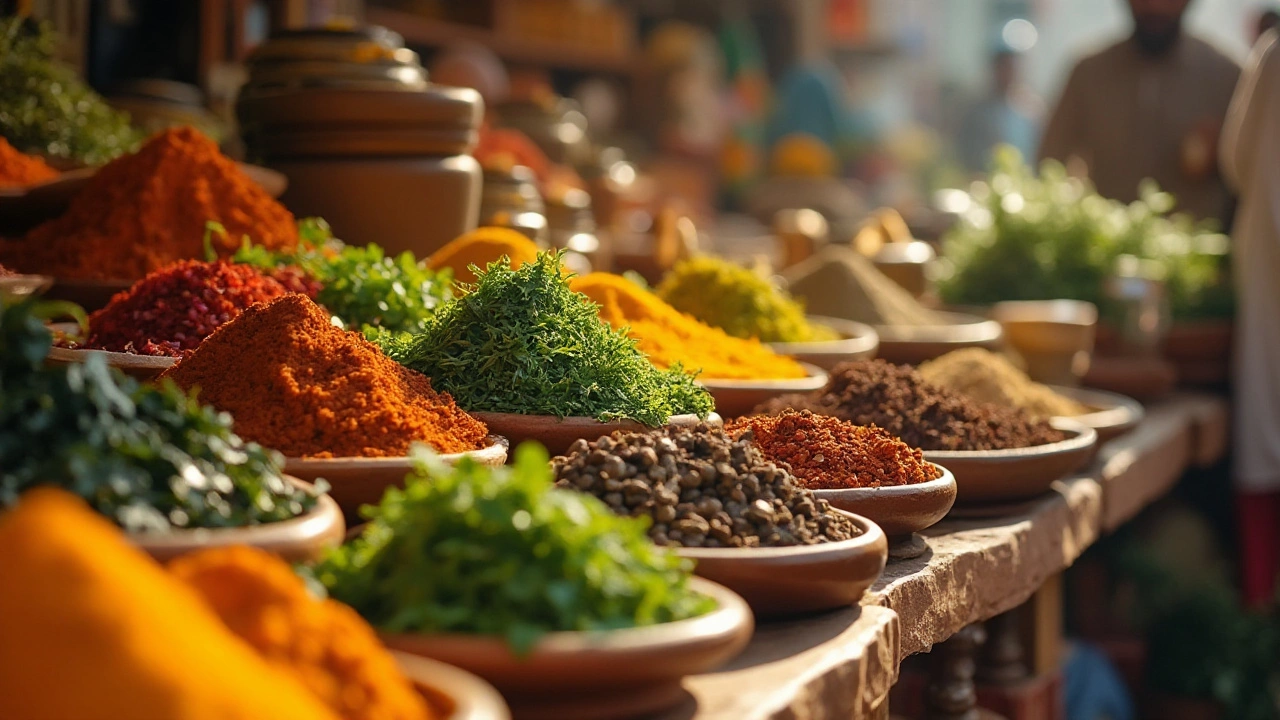- Home
- ::
- Discover the Top 5 Herbal Supplements for Better Health

Discover the Top 5 Herbal Supplements for Better Health
In the modern world of fast-paced living and quick fixes, it's refreshing to see a return to nature in the form of herbal supplements. People across the globe are seeking out natural alternatives to help support their health, and for good reason. Herbal supplements harness the power of plants, offering a gentle yet effective way to bolster wellness.
The ancient wisdom found in herbs continues to hold relevance today, and the choices available are vast. But where do you start? This article aims to shed light on some of the most revered herbal supplements, revealing both their traditional uses and modern applications. Whether you're looking to enhance your immune system or find calm in the chaos of life, the right supplement might just be a plant-based solution away.
- Understanding Herbal Supplements
- Echinacea: Nature's Immune Booster
- Turmeric: The Golden Spice of Life
- Ginkgo Biloba: Mind and Memory Enhancer
- Valerian Root: Nature's Tranquilizer
- Green Tea Extract: The Antioxidant Powerhouse
Understanding Herbal Supplements
Herbal supplements, often referred to as botanicals, are dietary supplements that derive from plants or plant parts used for their flavor, scent, or potential health benefits. These natural remedies have stood the test of time, being a staple in traditional medicines from different cultures worldwide, including Ayurveda, Traditional Chinese Medicine, and Native American traditions. The allure of herbal supplements lies in their origins, which often seem more organic and relatable compared to synthetic pharmaceuticals. But what exactly are people talking about when they mention herbal supplements, and how do they differ from the idea of a standard vitamin or a dietary additive?
Unlike conventional medicines, which are synthesized and often target specific symptoms or diseases, herbal supplements aim at promoting holistic wellness. They target not just the physical body but are believed to balance mental, emotional, and spiritual health as well. These supplements come in various forms, including capsules, powders, teas, tinctures, and even herbal beverages. Echinacea, turmeric, and ginseng are just a few examples of herbs that have made their way into modern-day regimes aiming for holistic healing. While they are generally considered safe, one needs to be informed about their use due to potential interactions with medications or specific health conditions.
One of the core reasons why individuals turn to herbal supplements is their extensive historical use and enduring reputation for efficacy. Details from several studies illustrate impressive health benefits. For instance, according to a comprehensive review published in the Journal of Alternative and Complementary Medicine, herbal supplements like Echinacea stimulate the immune system, reducing the chances of illness.
"The great advantage of herbal treatments is that they possess a long history of use and a vast amount of literature supporting their benefits," states Dr. Andrew Weil, a pioneer in the field of integrative medicine.
For those considering trying herbal supplements, understanding how they fit into one's regular diet is crucial. Start with identifying specific needs or health goals. It’s vital to do thorough research or consult with a healthcare professional to tailor the right herbal regimen that suits individualized needs. Intuition should not replace knowledge. Instead, supplement your decisions with evidence and reliable information to ensure safety and maximize effectiveness.
While herbal supplements are natural, it’s important to recognize that 'natural' does not automatically mean 'safe'. Measuring the benefit against the risk is crucial. Side effects can occur, particularly when herbals interact with prescribed medications. Additionally, factors like quality and concentration of the herbal product can vary widely, owing to governmental regulations differing around the world. Thus, when choosing a product, look for those that are standardized to a specified percentage of active ingredients and choose from reputable brands to ensure purity and efficacy.
Echinacea: Nature's Immune Booster
When discussing herbal supplements, Echinacea often tops the list due to its fabled powers in immune health. This distinctive flowering plant, native to North America, has been cherished by Native American tribes for centuries for its healing properties. It is often turned to in the modern era during cold and flu seasons, as it is believed to effectively bolster the body's natural defenses. Studies suggest that Echinacea might stimulate the immune system by increasing the number of white blood cells, which are essential for combating infections. The natural remedies community celebrates Echinacea's resilience as a traditional healing tool, although some nuances in its efficacy across different formulations and individual responses have been noted in contemporary research.
Among the various forms of Echinacea, from teas to capsules, the active compounds attributed to its benefits include alkamides, caffeic acid derivatives, and polysaccharides. Each of these components plays a crucial role in enhancing immune function, although the exact mechanisms remain an area of ongoing research. Dr. Paul Simons, a respected immunologist, once remarked,
'Echinacea is more than just a seasonal remedy; it invites us to explore the balance between traditional botanical wisdom and modern health needs.'His statement reflects how Echinacea, though ancient in its use, continues to be a conversation starter in both the scientific and holistic health arenas today.
It is interesting to note that Echinacea, typically seen in purple cone-flowers, made its way into European medicine in the 1900s and has since spread worldwide. While its ability to directly cure illnesses is still debated, its effectiveness as a complementary measure is worth considering. Whether you integrate it as tinctures or as extract powders, it is prudent to consult with healthcare professionals for personalized guidance. Such consultations can ensure you maximize its benefits, especially if you're already on medication or have specific health conditions. Given its long history and ongoing use, many embrace Echinacea not merely for its supposed medical value but as a testament to nature's generosity in providing aids to wellness.
Forms and Uses of Echinacea
Echinacea is available in a plethora of forms, including tablets, teas, concentrated drops, and creams. Those new to the world of health supplements might wish to start with teas or capsules, which offer a mild introduction to this botanical powerhouse. For those facing seasonal threats like the common cold, taking Echinacea at the earliest signs might lessen the severity and duration of symptoms. Some even turn to topical creams infused with Echinacea to support skin health, targeting minor wounds or irritations. As always, dosage and form should be tailored to one's age, health status, and specific needs.
Turmeric: The Golden Spice of Life
Among the pantheon of herbal supplements, turmeric shines like a beacon, celebrated not just for its vibrant color but for its unparalleled benefits. This spice, with its warm hue and potent properties, traces its origins to Southeast Asia, where it has been an integral part of both culinary and medicinal practices for thousands of years. At the heart of turmeric's magic is curcumin, a compound renowned for its anti-inflammatory and antioxidant capabilities. The traditional use of turmeric in Ayurvedic medicine highlights its role in maintaining a balanced body, and this age-old wisdom is now backed by contemporary science.
The journey of turmeric from kitchen cupboards to dietary supplements is a testament to its versatility. It's not just a staple in curries; it's also found in lattes, health shots, and even skin care products. Studies have shown that curcumin can help combat inflammation, which is linked to various chronic illnesses such as heart disease, arthritis, and diabetes. A fascinating fact is a study published in the Journal of Medicinal Food, which suggests that regular intake of turmeric can significantly improve symptoms of arthritis, offering a natural alternative to conventional pain relievers. Its role as a powerful antioxidant means it helps neutralize free radicals, potentially slowing down the aging process and curbing diseases often associated with aging. As lovely as these benefits may be, it’s important to note that curcumin by itself is absorbed poorly into the bloodstream, necessitating the presence of another compound, piperine, which is found in black pepper and can enhance absorption by an astonishing 2,000%.
Embracing turmeric as part of a daily health regimen can be both a preventative measure and a therapeutic intervention. Adding a teaspoon to morning smoothies or brewing it as a tea are just a few of the numerous ways to incorporate this wonder spice into your life. Some choose to take it in capsule form, ensuring a consistent dosage of the active ingredient. It’s not just in its health benefits that turmeric earns its title as a superfood; its ability to enhance flavor while offering medicinal advantages makes it an all-round champion in the arsenal of natural remedies. A quote from the renowned herbalist, Michael Tierra, encapsulates its essence:
"Turmeric is one of nature's most powerful healers."Embracing this golden spice not only connects us with tradition but also ushers in an era of wellness where nature takes center stage.
Ginkgo Biloba: Mind and Memory Enhancer
Ginkgo Biloba is often celebrated as a cornerstone of traditional herbal *supplements*. Its long history roots back thousands of years to ancient China, where it was believed to stabilize the body's energy levels and promote longevity. Today, *Ginkgo Biloba* holds a special place in the world of natural remedies, primarily for its potential to boost cognitive function and enhance memory. Widely studied, this herb's efficiency has garnered attention from both scientists and traditional practitioners alike.
The secret to its mind-sharpening abilities lies in the flavonoids and terpenoids that Ginkgo Biloba contains. These powerful antioxidants work their magic by promoting blood flow and protecting against neuronal damage. Enhanced circulation means more oxygen and nutrients reach the brain, potentially boosting alertness and cognitive speed. There are numerous clinical studies supporting these claims, and though results vary, many have noted improvements in various measures of memory and executive function. Notably, this supplement is revered for its ability to combat age-related cognitive decline, making it a favored choice among older adults seeking to maintain mental clarity.
"Ginkgo Biloba's role in cognitive enhancement is promising, but more research is needed to fully understand its effects," emphasizes Dr. James Augustine, a researcher in the field of neuropharmacology.
For those considering Ginkgo, integrating it into a daily routine can be simple. It can be found in various forms, from capsules to teas, making it accessible for different preferences. It's crucial to start with recommended doses, often ranging from 120 mg to 240 mg per day, and to seek advice from healthcare professionals if you're on any medications. This herbal supplement is generally well-tolerated, but it's wise to stay informed about potential interactions and side effects, particularly for individuals on blood thinners due to Ginkgo's blood-flow-enhancing properties. There's also potential for allergenic reactions, though these remain relatively rare.
For those captivated by data, a study conducted in 2022 with participants aged 55 and older showed that consistent Ginkgo Biloba use led to improved cognitive scores in 60% of the subjects over a six-month period. Such findings hint at Ginkgo's capacity to serve as a part of a broader strategy for cognitive health, alongside lifestyle factors like diet and mental exercises. The dialogue surrounding Ginkgo Biloba presents a mix of age-old tradition and cutting-edge research, culminating in a supplement that continues to intrigue and benefit many in their quest for optimal brain function.

Valerian Root: Nature's Tranquilizer
Valerian root has long held a place of esteem among those who seek natural solutions for stress and anxiety. This earthy-smelling herb is recognized for its calming effects, earning its name as nature's tranquilizer. For centuries, the root of the valerian plant has been used to aid sleep and ease nervous tension, with records of its use dating back to ancient Greece and Rome. As the pace of modern life grows ever more frantic, people are once again turning to this humble herb to find solace from stress and pressure.
"Valerian is often used as an alternative to conventional medicine for anxiety and sleep disorders," says Dr. Anne Wallcott, a herbal medicine expert at Greenfield Institute.
The secret to valerian's soothing effects lies in its unique chemical composition. It contains compounds that interact with the brain's neurotransmitters, increasing levels of GABA, which helps promote feelings of calm. Unlike many pharmaceutical sedatives, valerian works gently with the body without creating a state of grogginess upon waking. Its efficacy has been supported by a range of studies, particularly in relation to improving sleep quality.
How to Use Valerian Root
If you're considering incorporating herbal supplements into your routine, valerian root is typically available in several forms, including capsules, tea, and liquid extracts. Each form provides convenience and can cater to personal preference and lifestyle. Tea made from dried valerian root is a popular option, offering a calming ritual before bedtime. For those with a more hectic schedule, capsules provide an easy way to benefit from valerian's soothing properties without preparation time.
It is important to follow recommended dosages when using valerian root, usually ranging from 300 to 600 milligrams taken about an hour before sleep. However, as with any supplement, it's wise to consult with a healthcare provider to determine the most suitable approach for your health needs. While considered generally safe, some individuals might experience mild side effects like dizziness or digestive upset, particularly at higher doses.
Scientific Support and Popularity
The effectiveness of valerian has been widely studied, although results can vary depending on the individual and the specific condition being treated. A meta-analysis of valerian's effect on sleep found that while improvements may be modest compared to some pharmaceuticals, the absence of significant side effects makes it an attractive option for those cautious about chemical sedatives. As interest in natural remedies continues to rise, the popularity of valerian root grows in tandem. People are eager to explore ways to support their wellness naturally, without the dependency risks associated with some synthetic alternatives.
Green Tea Extract: The Antioxidant Powerhouse
Green tea has been a staple in Asian cultures for centuries. This humble beverage, derived from the Camellia sinensis plant, contains a potent concentration of antioxidants known as catechins. Epigallocatechin gallate (EGCG) is the most abundant catechin in green tea, and it's credited with many of the health benefits attributed to green tea extract. These antioxidants are considered crucial for combating free radicals in the body, which can cause oxidative stress and lead to premature aging and various chronic diseases.
Research indicates that green tea extract not only supports cardiovascular health but also enhances brain function. A study published in the journal Phytomedicine found that regular consumption of green tea could improve cognitive performance and reduce the risk of neurodegenerative diseases like Alzheimer's and Parkinson's. Rich in L-theanine, green tea promotes a state of calm focus, making it a perfect supplement for those seeking to improve focus without the jitters often associated with caffeine.
"Green tea is more than just a refreshing drink—it's a powerhouse of functional benefits," says Dr. David Nieman, professor at Appalachian State University, known for his research on health benefits of polyphenols.
Remarkably, green tea extract is also credited with aiding in weight loss. It accelerates fat oxidation and can enhance the metabolic rate during exercise, making it a favorite among fitness enthusiasts. A detailed analysis of numerous studies revealed that those who regularly consumed green tea extract lost more weight than those who did not. This makes it a natural ally for anyone striving to achieve or maintain a healthy body weight.
When it comes to incorporating green tea extract into your routine, it's essential to consider quality and dosage. Available in various forms such as capsules, powders, and liquids, it's vital to choose products that offer high purity and potency. Reading labels and opting for reputable brands ensures that you receive the benefits without harmful additives or excessive caffeine.
With all these attributes combined, green tea extract truly stands out as a robust natural remedy. Whether you're aiming to support your health, enhance your wellness regimen, or simply want an additional boost in your day, this humble supplement has the potential to transform your wellbeing. It's no wonder that herbal supplements like green tea extract are gaining a dedicated following worldwide—there truly is something here for everyone to benefit from.

 Health and Wellness
Health and Wellness





Write a comment